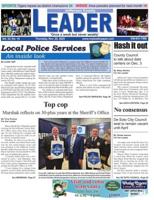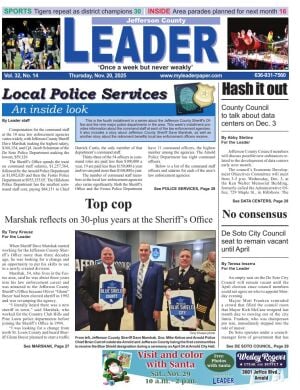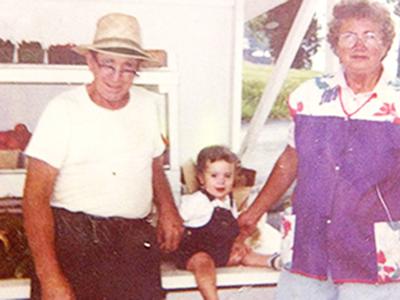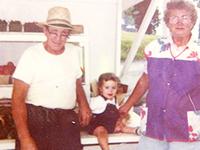Arnold farmer Marvin Keller liked to remind people where the food they eat comes from.
“The preschool teacher at St. John’s (Lutheran School in Arnold) would bring little kids over to the farm, and he enjoyed showing them how vegetables were grown,” said Mr. Keller’s daughter, Eunice Glover, 61, of Kirkwood. “He made sure they knew that food didn’t come just from Schnucks.”
Mr. Keller died June 17 at age 92. He had worked the farm, just south of the church, since the 1950s.
He grew up one of seven children on a farm in Mehlville, helping his parents sell their harvests on St. Louis’ Produce Row.
He met Esther Averbach, the daughter of an Arnold farmer, through his older brother. “They had a few dates at the Gravois Farmers Club, church picnics, that kind of thing,” Eunice said. “They got married in 1951 and honeymooned at Lake of the Ozarks.”
The Kellers settled into life in the area between I-55 and Jeffco Boulevard, then called Beck.
“During the Depression, there was a general store, gas station, bar, a barbershop,” Eunice said. “My great-grandfather, Casper Noll, built the house there, and after he retired from farming, he lived in one room and rented out the other three.”
Her grandfather, John Averbach, grew vegetables and livestock on a 90-acre tract between Jeffco and Tenbrook, where the Strawberry Creek Nature Area is now.
Mr. Keller took over the farm’s egg and vegetable route.
“They raised corn and soybeans, and their main vegetable crops were tomatoes, strawberries and potatoes,” Eunice said. “They had Hereford cattle and hogs, and they would sell them at the stockyards in East St. Louis.”
Eunice said her father developed a reputation for sausage-making.
“Everybody wanted Marvin to come and help when they butchered hogs, so he’d make that sausage,” she said with a laugh.
Eunice said her father saw a lot of changes over his eight decades of farming.
“He started out with mules,” she said. “He had a John Deere tractor, but he liked his old 1951 Ford tractor better than anything.”
Mr. Keller took over the farm operation in the late 1960s, after his father-in-law died. “My dad said, ‘I’m my own boss now, and I can raise whatever I want to.’ The first thing he did was to sell the old Averbach place. He went back to growing just vegetables, and he quit the route.”
Mr. Keller sold his produce from a small white wagon right on his property.
Eunice said her dad was always willing to lend a hand to neighbors.
“He was always their go-to man,” she said. “If you needed help, you didn’t have to ask twice.”
His strength was legendary.
“He was strong as an ox until the time of his death,” his daughter said. “He could lift a 300-pound hay bale in each hand and throw them onto the truck.”
Mr. Keller left school after the sixth grade and was self-conscious about his lack of formal education.
“I know that bothered him, but he could do so many things,” Eunice said.
“He butchered hogs, castrated bulls, delivered animals when they gave birth. He could take a tractor apart and put it back with no problem.”
The Keller children followed their father’s advice and did not follow his footsteps. Eunice went into the nursing field; her brother became a mechanical engineer.
“He didn’t want us to work as hard as he did all his life,” Eunice said.
Mr. Keller gradually found himself the last holdout of a vanishing way of life.
“He would say he was the last farmer in Arnold,” Eunice said. “And that made him sad. He missed his friends.”
After his wife’s death in 2014, Mr. Keller’s enthusiasm waned.
“He took care of her when she became wheelchair-bound due to arthritis,” Eunice said. “He dressed her, put on her makeup, did her hair. When Mom died, it broke his heart. He still grew his vegetables with some help, but it wasn’t the same.”
Mr. Keller opened the produce stand on Memorial Day in 2018, as usual, but the season was cut short when he fell a few days later.
“He hit his head and scraped his arm real bad,” Eunice said. “He said it was no big deal; but I made him go to Urgent Care. They sent him to the hospital, and they diagnosed him with vascular dementia and said he couldn’t live on the farm anymore.”
Mr. Keller moved to Friendship Village in Sunset Hills, where he was “well loved,” his daughter said.
“The hardest part for him was not being outdoors all the time.”
Eunice said it was bittersweet when the family sold the farm in May to St. John’s.
“After the farm was sold, Daddy said he didn’t want to be here anymore; he wanted to go home to Mom,” she said.
She said her father will be remembered as a good man who was always there to help others.
“There was only thing he said he wanted to do that he didn’t get to,” she said. “And that was to die in his garden, like a true farmer.”




